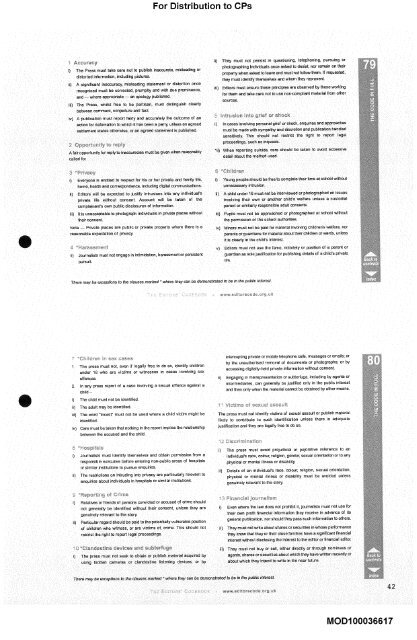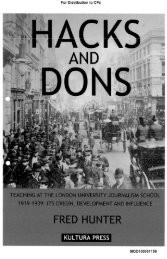The Edi ' - The Leveson Inquiry
The Edi ' - The Leveson Inquiry
The Edi ' - The Leveson Inquiry
You also want an ePaper? Increase the reach of your titles
YUMPU automatically turns print PDFs into web optimized ePapers that Google loves.
o<br />
it)<br />
iii)<br />
<strong>The</strong> Press must take care not to publish inaccurate, misleading or<br />
distorted information, including pictures,<br />
A significant inaccuracy, misleading statement or distortion once<br />
recegnised must be corrected, promptly and with due prominence,<br />
and -- where appropriate -- an apology published.<br />
<strong>The</strong> Press, whilst free to be partisan, must distinguish clearly<br />
between comment conjecture and fact.<br />
iv) A publication must report fairly and accurately the outcome of an<br />
action for defamation to which it has been a party, unless an agreed<br />
settlement states otherwise, or an agreed statement is published.<br />
A fair opportunity for rapty to inaccuracies must be given when reasonably<br />
called for<br />
For Distribution to CPs<br />
") Everyone is entitled to respect for his or her private and family life,<br />
home, health andcorrespondenca, in~uding digital communications.<br />
ii) <strong>Edi</strong>tors wilt be expected to justify intrusions into any individual’s<br />
private life without consent. Account will be taken of the<br />
complainant’s own public disclosures c~ information<br />
iii) tt is unacceptable to photograph individuals in pdvate places without<br />
their consent.<br />
Note -- Private places are public or private property where there is a<br />
reasonable expectation of ptivacy<br />
ii)<br />
Journalists must not engage [n intimidation, harassment or persistent<br />
pursuit,<br />
it)<br />
<strong>The</strong>y must not persist in questioning, teleghonmg, pursuing or<br />
photographing individuals once asked to desist; nor remain on their<br />
property when asked to leave and must not follow them. if requested,<br />
they must identify themselves and whom they represent.<br />
iii) <strong>Edi</strong>tors must ensure these principles are observed by those working<br />
for them and take care not to use non-compliant material from other<br />
Sources.<br />
i) In cases involving personal gdef or shock, enquiries and approaches<br />
must be made with sympathy and discretion and publication handled<br />
sensitively This should not restrict the right to report legal<br />
proceedings, such as inquests.<br />
*ii:t When reporting suicide, care should be taken to avoid excessive<br />
detail about the method used.<br />
i) Young people should be free to complete their time at school without<br />
unrlecassery intrusion<br />
it) A child under 16 must not be interviewed or photographed on issues<br />
involving their owe er another child’s welfare unless a custodial<br />
parent or similarly responsible adult consents.<br />
Pupils must not be approached or photographed at school without<br />
the permiasmn of the school authorities.<br />
Minors must not be paid for materietinvelvlng child ren’s welfare, nor<br />
parents or guardians for matedal about their children or wards, unless<br />
it is clearly in the child’s interest.<br />
v) <strong>Edi</strong>tors must not use the fame, notoriety or position of a parent or<br />
guardian as sole justification for publishing details of s chtld’s private<br />
life.<br />
<strong>The</strong>re may be exceptions to the clauses marked ~ where they can Be demonstrated ~o be it] the public interest.<br />
1. <strong>The</strong> press mus~: nor, even if legally free to do so, identify children<br />
under 16 who are victims or witnesses in cases involving sex<br />
offences.<br />
2. ]n any press report of a case involving a sexual offence against a<br />
child -<br />
[) <strong>The</strong> child must not be ident[fiec<br />
[i) <strong>The</strong> adult may be identified.<br />
intercepting pdvate or mobile telephone calls, messages or emails; or<br />
by the ucauthor~sed removal of documents or photographs; or by<br />
acceaslng digitally-held private information without consent<br />
Engaging in misrepresentation or subterfuge, including by agents or<br />
intermediaries, can generally be justified only in the public interest<br />
and then only when the material cannot be obtained by other means.<br />
~L ;’~s "~ s ~< -~! aSS~.:b~f~<br />
iii) <strong>The</strong> word "incest" must not be used where a child victim might be <strong>The</strong> press must not identity victims of sexual assault or publish material<br />
identified, likely to contribute re such identlf~cetion unless there is adequate<br />
iv) Care must be taken that nothing in the report ~mpl[as the relationship<br />
between the accused and [he child,<br />
justification and they are legally free to do so.<br />
i) Journalists must identti~’ themselves and obtain permission from a<br />
responsible executive before entering non-public areas of hospitals<br />
or similar institutions to pursue enqu~das.<br />
it) <strong>The</strong> restrictions on intruding into privacy are particularly relevant to<br />
enquiries about individuals in hospitals or similar institutions.<br />
i) <strong>The</strong> press must avoid ~rajudicial or pejorative reference to an<br />
individual’s race, colour, religion, gender, sexua orientation or to any<br />
physical or mental il hess or disability<br />
Details of an individual’s race, celour, religion, sexual orientation<br />
physical or men~a illness or disability must be avoided unless<br />
genuinely relevant to the story.<br />
i) Relatives or friends of persons convicted or accused of crime should<br />
not generally be identified without their consent unless they are i) Even where the law does not prohibit it, journalists must not use for<br />
genuinely relevant to the story,<br />
their own profit financial information they receive in advance of its<br />
ii) Particular regard should be paid to the potentially vulnerable position<br />
genera] publication, nor should they pass such information to others.<br />
of children who witness, or are victims or crime. This should not ti) <strong>The</strong>y must not writeabout shards orsecuritias inwhcee performance<br />
restrict the right to report legal proceedings, they know that they or their close families have a significant financial<br />
interest without disclosing the interest to the editor or financial editor.<br />
(~ "~t~I~S~’~ @8~6:~S 8~ ~g~@~~-~ iii) <strong>The</strong>y must not buy or sell, either directly or through nominees or<br />
i) <strong>The</strong> press must not seek to obtain or publ sh material acquired by<br />
using hidden cameras or clandestine listening devices; or by<br />
agents, shares or sasurities aboutwhich they bave written recentlyor<br />
aboutwhich they intend towdte in the ncarfuture.<br />
<strong>The</strong>re may be exceptions to the clauses rnarkee * where they can be ¢lemons~ra~ed to be in the public interest,<br />
MAD100036617<br />
42
















